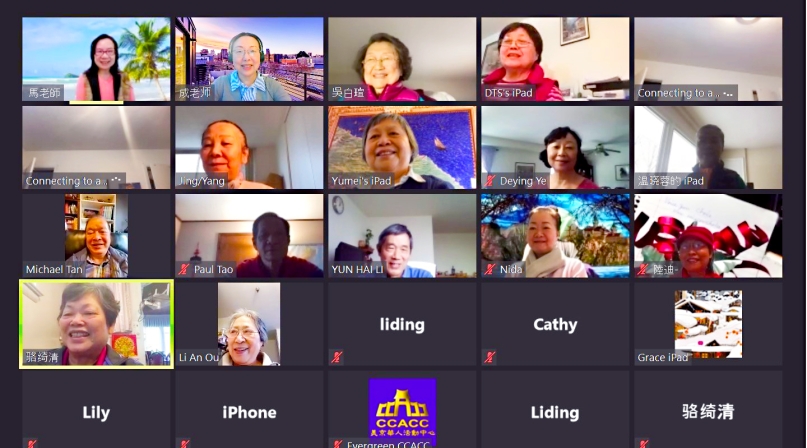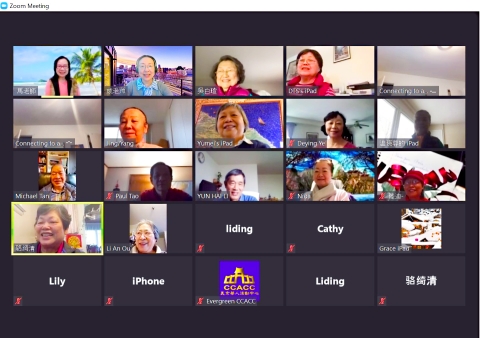Problem:
|
The COVID-19 pandemic shut down in-person technology training sessions for older adults.
|
Solution:
|
Switch all courses and training online, while increasing outreach to guide older adults to use online platforms.
|
Montgomery County, Md., Department of Technology Services staff knew when COVID-19 hit in March 2020, they would need to pivot an already-existing, in-person technology training program to a virtual platform to help older adults navigate the new online world.
The county partnered in 2016 with Older Adults Technology Services to launch Senior Planet Montgomery. The program was held at 16 senior centers and libraries throughout the county and teaches individuals 55 and older how to use technology.
But when the pandemic hit, Senior Planet Montgomery transformed into the Senior Planet Montgomery Home Edition to deliver all the same training via online platforms.
Senior Planet Montgomery Regional Director Shivali Haribhakti said the transition to all virtual training was rocky at first.
The county first decided what platform to use for the technology trainings and selected Zoom. Haribhakti said Zoom is easy and accessible because it does not require an email and participants can dial in through a phone without needing a wired connection.
She said planning for virtual programming required more steps compared to planning in-person meetings.
“That has made us think a little bit harder and more intentionally about how to make a program successful,” Haribhakti said.
She said the county worked to create curriculum specific to the digital space, initially posting technology guides and “how to Zoom” videos online along with “stuck at home” guides for virtual ways to shop online or connect with friends.
A key to the virtual pivot was outreach, Haribhakti said. Staff worked to get the word out about the virtual offerings and inform those who participated in the in-person trainings that new trainings would be available online.
Senior Planet Montgomery established a hotline while staff made outreach phone calls and spoke on Telemundo and other cable news shows. Additionally, county summer youth workers provided one-on-one tech support for older adults and helped sign up individuals for low-cost internet programs.
“One of the silver linings of COVID is that we were able to really get the word out to a lot more people than we were in person just because of the outreach and how easy it was to do from home,” Haribhakti said.
The program now offers more than 200 classes created for the virtual space that are 60-minute lectures. Courses are now taught by two trainers to allow one person to teach while the other helps those having trouble getting online.
Zoom lectures cover a variety of topics ranging from Facebook, Zoom, Google maps, iPhones, Twitter, telemedicine, ride sharing apps and online shopping.
The wide variety of topics offered online brought an influx of participants to the trainings. The county served 846 participants in the first three quarters of 2020 before the pandemic. In the first three quarters of offering online trainings, the county served a total of 8,804 participants.
These online programs supported 10 times as many participants compared to the in-person trainings.
Senior Planet Montgomery Home Edition also targeted underserved populations by providing different courses in English, Spanish and Chinese.
Haribhakti said they partnered with the Chinese Cultural Center in the county which helped identify residents who would benefit from the programming. This led to the creation of an iPad essentials course taught in Mandarin — the first training held in this language in the county.
“We specifically are addressing the county’s underserved populations that speak Spanish and Mandarin through classes in those languages,” she said.
Haribhakti emphasized that many older adults faced challenges with social isolation at the beginning of the pandemic.
The pandemic “really puts social isolation into a magnifying glass and Senior Planet was very cognizant of older adults feeling socially isolated and needing to connect as a result of the pandemic,” she said.
One program called Hello Montgomery County is held every two weeks and simulates a senior center lobby to provide an open dialogue for small talk.
“There was a lot of thought put into some of the programming that we had to make sure that they were really encouraging that sort of engagement,” Haribhakti said.
She said Senior Planet Montgomery is slowly returning to in-person events, but still plans to have a virtual presence with a blended model of both in-person and virtual options for participants.





